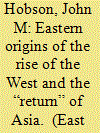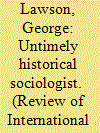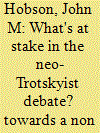|
|
|
Sort Order |
|
|
|
Items / Page
|
|
|
|
|
|
|
| Srl | Item |
| 1 |
ID:
145136


|
|
|
|
|
| Summary/Abstract |
With the current interest in China (and India) proliferating within the Western Academy, this article claims that what we are witnessing today is not the rise but the “return” of China (and India). Many academics assume that the West has been the dominant civilization in the world economy in the last 500 years and that the current “rise” of China threatens to knock the West off its perch. However, this article provides an alternative take to this cherished axiom of Eurocentric world history by inverting the standard belief that the West pioneered modernity and then expanded outwards to remake the world. Thus, I argue not only that globalization preceded the rise of the West but that it was Eastern-led on the one hand and that it enabled the Western breakthrough into modernity on the other. This, in turn, rests on my claim that Chinese development stems back not to 1978 but to 960 ce as the Sung Dynasty emerged and subsequently undertook a quasi-industrial miracle. Moreover, between 1450/1492 and ca. 1830 China lay at the centre of the nascent global economy, fanning the integration process alongside other key non-Western regions such as India and West Asia/North Africa. And, while the West was the dominant player after ca. 1830 down to the turn of the third millennium, nevertheless, what we witness today is the return of China to the centre of the global economy whence it came.
|
|
|
|
|
|
|
|
|
|
|
|
|
|
|
|
| 2 |
ID:
155804


|
|
|
|
|
| Summary/Abstract |
This article offers a critique of Alexander Anievas and Kerem Nişancioğlu’s How the West came to rule: the geopolitical origins of capitalism. We argue that while all historiography features a number of silences, shortcomings or omissions, the omissions in How the West came to rule lead to a mistaken view of the emergence of capitalism. There are two main issues to be confronted. First, we argue that Anievas and Nişancioğlu have an inadequate and misleading understanding of “capital” and “capitalism” that tilts them towards a theoretical stance that comes very close to arguing that everything caused capitalism while at the same time having no clear and convincing definition of “capital” or “capitalism”. Second, there are at least three omissions—particular to England/Britain within a geopolitical context—that should be discussed in any attempt to explain the development of capitalism: the financial revolution and the Bank of England; the transition to coal energy; and the capitalization of state power as it relates to war, colonialism and slavery. We conclude by calling for a connected-histories approach within the framework of capital as power.
|
|
|
|
|
|
|
|
|
|
|
|
|
|
|
|
| 3 |
ID:
155155


|
|
|
|
|
| Summary/Abstract |
This article examines the historical sociology that informs Andrew Linklater’s Violence and Civilization in the Western States-Systems. On the sociological side, it critically assesses Linklater’s use of Elias and Wight, arguing that his ‘higher level synthesis’ is internally incompatible. On the historical side, the article argues that the occlusion of the transnational interactions that, in great measure, drive historical development means that Linklater’s analysis is inadequate for its stated purpose: to chart the development of civilising processes within the Western state-systems.
|
|
|
|
|
|
|
|
|
|
|
|
|
|
|
|
| 4 |
ID:
110480


|
|
|
|
|
| Publication |
2011.
|
| Summary/Abstract |
This article seeks to appraise the direction that historical sociology has undertaken within Millennium in the last four decades while simultaneously laying out the groundwork for a 'thirdwave' historical sociology of international relations. In particular, I intervene in the current neo-Trotskyist debate concerning whether the concept of uneven and combined development (U&CD) should be historically generalised or merely confined to the modern capitalist-industrial era that emerged as late as the 19th century. My aim is to support the former position. I argue that failure to historically generalise the concept - at least to a certain extent - leads ultimately into a Eurocentric cul-de-sac. To advance my third-wave non-Eurocentric historical sociological approach, I apply U&CD to the rise of the West in general and to British industrialisation in particular. By extending U&CD back to at least 800 CE, I argue that the West was a late developer that enjoyed the advantages of backwardness. That is, only by borrowing from, and assimilating the technologies, ideas and institutions of, the key early developers - China, India and the Islamic Middle East/North Africa - could Europe rise up from its tiny promontory on the far western edge of the vast Afro-Asian economy to eventually overtake its Eastern predecessors some time during the 19th century.
|
|
|
|
|
|
|
|
|
|
|
|
|
|
|
|
| 5 |
ID:
124621


|
|
|
|
|
| Publication |
2013.
|
| Summary/Abstract |
This article draws on the theory of uneven and combined development (U&CD) to construct a non-Eurocentric and 'internationalist' analysis of the transition to capitalism. In doing so, we seek to respond to and rethink two challenges: exposures of Eurocentric notions of the 'Rise of the West' on the one hand; and recent critiques of Eurocentric assumptions in the theory of U&CD on the other. Beginning with an assessment of Robert Brenner's Anglo-centric theorisation of capitalism's origins, we argue Brenner's efforts are hamstrung by an omission of international determinations and conditions. In turn, we retrace these missing international factors through an analysis of the Mongol invasions of the 13th/14th centuries, Ottoman imperial expansion in the 15th/16th centuries and the contemporaneous discovery and colonisation of the New World. We argue that each case demonstrates the historically specific forms of U&CD that fed into - and ultimately determined - the developmental trajectory of capitalism in north-western Europe.
|
|
|
|
|
|
|
|
|
|
|
|
|
|
|
|
|
|
|
|
|